Related Research Articles

Lindsay Hamilton Simpson Thompson AO, CMG was an Australian politician and army officer who served as the 40th premier of Victoria from 1981 to 1982. He previously served as the 19th deputy premier of Victoria from 1972 to 1981.

Donald Allan Dunstan was an Australian politician who served as the 35th premier of South Australia from 1967 to 1968, and again from 1970 to 1979. He was a member of the House of Assembly (MHA) for the division of Norwood from 1953 to 1979, and leader of the South Australian Branch of the Australian Labor Party from 1967 to 1979. Before becoming premier, Dunstan served as the 38th attorney-general of South Australia and the treasurer of South Australia. He is the fourth longest serving premier in South Australian history.

Thomas Playford was an Australian politician who served two terms as Premier of South Australia. He subsequently entered federal politics, serving as a Senator for South Australia from 1901 to 1906 and as Minister for Defence from 1905 to 1907.
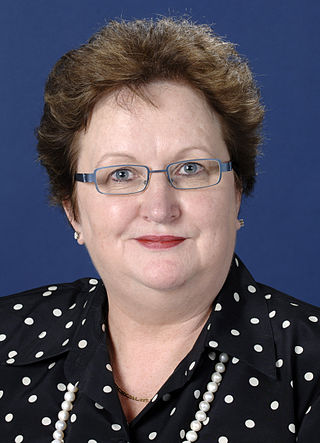
Amanda Eloise Vanstone is an Australian former politician and a former Ambassador to Italy. She was a Liberal Senator for South Australia from 1984 to 2007, and held several ministerial portfolios in the Howard government. After her resignation from the Senate in 2007, she served as the Australian Ambassador to Italy until July 2010. Her time as Minister for Immigration was marked by controversies within the Department of Immigration and Multicultural and Indigenous Affairs.

Nicholas Frank Hugo Greiner (;) is an Australian politician who served as the 37th Premier of New South Wales from 1988 to 1992. Greiner was Leader of the New South Wales Division of the Liberal Party from 1983 to 1992 and Leader of the Opposition from 1983 to 1988. Greiner had served as the Federal President of the Liberal Party of Australia from 2017 to 2020. He is the current Consul-General in the United States of America, New York.

Sir Frederick William Holder was an Australian politician. He was Premier of South Australia from June to October 1892 and again from 1899 to 1901. He was a prominent member of the inaugural Parliament of Australia following Federation in 1901, and was the first Speaker of the Australian House of Representatives.

James Goodall Francis, Australian colonial politician, was the 9th Premier of Victoria. Francis was born in London, and emigrated to Van Diemen's Land in 1847, where he became a businessman. He moved to Victoria in 1853 and became a leading Melbourne merchant. He was a director of the Bank of New South Wales and president of the Melbourne Chamber of Commerce. He married Mary Ogilvie and had eight sons and seven daughters.
Joyce Steele was an Australian politician and one of the first two women elected to the Parliament of South Australia, the other being Jessie Cooper. Steele was elected to the House of Assembly and Cooper was elected to the Legislative Council at the 1959 election. Ironically, while South Australian women had been given the right to vote and stand for election—a right they had gained at the 1896 election—South Australia had been the last state to elect a female representative.
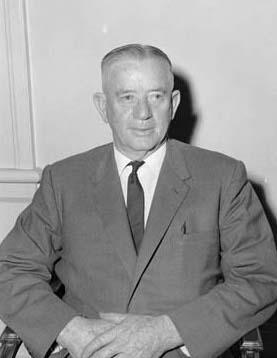
Francis Henry Walsh was the 34th Premier of South Australia from 10 March 1965 to 1 June 1967, representing the South Australian Branch of the Australian Labor Party.

Robert Stanley Richards was an Australian politician who served as the 32nd Premier of South Australia, representing the South Australian Branch of the Australian Labor Party.
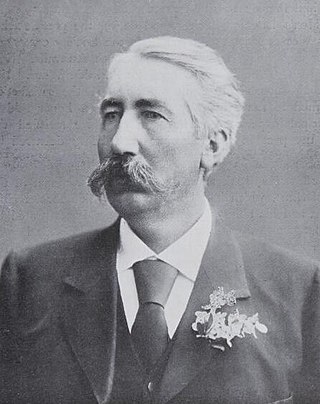
John Greeley Jenkins was an American-Australian politician. He was Premier of South Australia from 1901 to 1905. He had previously served as Minister for Education and the Northern Territory and Commissioner for Public Works under Thomas Playford II, Commissioner of Public Works under Charles Kingston and Chief Secretary under Frederick Holder. He was subsequently Agent-General for South Australia from 1905 to 1908.

Sir Thomas Playford was an Australian politician from the state of South Australia. He served continuously as Premier of South Australia and leader of the Liberal and Country League (LCL) from 5 November 1938 to 10 March 1965. Though controversial, it was the longest term of any elected government leader in Australian history. His tenure as premier was marked by a period of population and economic growth unmatched by any other Australian state. He was known for his parochial style in pushing South Australia's interests, and was known for his ability to secure a disproportionate share of federal funding for the state as well as his shameless haranguing of federal leaders. His string of election wins was enabled by a system of malapportionment and gerrymander later dubbed the "Playmander".
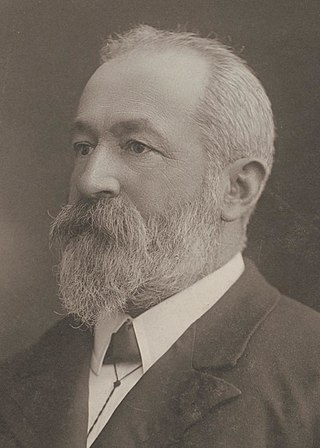
Richard Witty Foster was an Australian politician. He began his career in the Parliament of South Australia (1893–1906) and served two terms as Commissioner of Public Works in liberal and conservative governments. He was elected to federal parliament in 1909 as a Liberal, later joining the Nationalists. He was Minister for Works and Railways (1921–1923) under Prime Minister Billy Hughes, eventually losing his seat at the 1928 election.

Leslie Royston Johnson AM was an Australian politician. He was a member of the Australian Labor Party (ALP) and held ministerial office in the Whitlam government, serving as Minister for Housing (1972–1973), Works (1973), Housing and Construction (1973–1975), and Aboriginal Affairs (1975). He represented the Division of Hughes in New South Wales from 1955 to 1966 and from 1969 to 1983. He later served as High Commissioner to New Zealand from 1984 to 1985, cutting short his term due to his daughter's ill health.

Alfred Catt was a South Australian politician. He was a member of the South Australian House of Assembly from 1881 to 1902, representing the electorates of Stanley (1881–1884) and Gladstone (1884–1902). He was Commissioner for Public Works under John Cox Bray from 1881 to 1884 and again under Thomas Playford II from 1887 to 1889.
The Fahey–Murray ministry (1992–1993) or Second Fahey–Murray ministry or Second Fahey ministry was the 83rd ministry of the New South Wales Government, and was led by the 38th Premier of New South Wales, John Fahey, representing the Liberal Party in coalition with the National Party, led by Wal Murray.

Sir Shirley Williams Jeffries was a member of the South Australian House of Assembly in three stints over twenty five years and an Australian rules footballer in the South Australian Football League (SAFL).
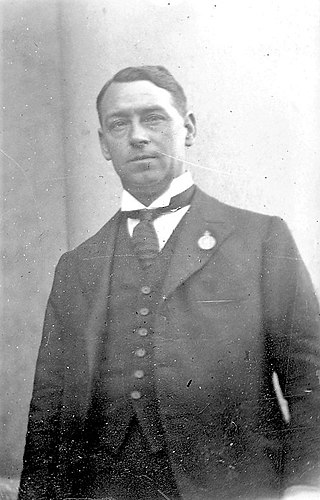
Sir Herbert Sydney Hudd was an Australian politician who represented the South Australian House of Assembly seats of Torrens from 1912 to 1915 for the Liberal Union and Alexandra from 1920 to 1938 and from 1941 to 1948 for the Liberal Federation and the Liberal and Country League.

The South Australian Liberal Party, officially known as the Liberal Party of Australia (South Australian Division), is the South Australian Division of the Liberal Party of Australia. It was formed as the Liberal and Country League (LCL) in 1932 and became the South Australian Division of the Liberal Party when the Liberal Party was formed in 1945. It retained its Liberal and Country League name before changing to its current name in 1974. It is one of two major parties in the bicameral Parliament of South Australia, the other being the Australian Labor Party (SA Branch). The party has been led by Leader of the Opposition David Speirs since the 2022 state election after a one-term government.
References
- Former Members of the Parliament of South Australia (Parliament of South Australia)
